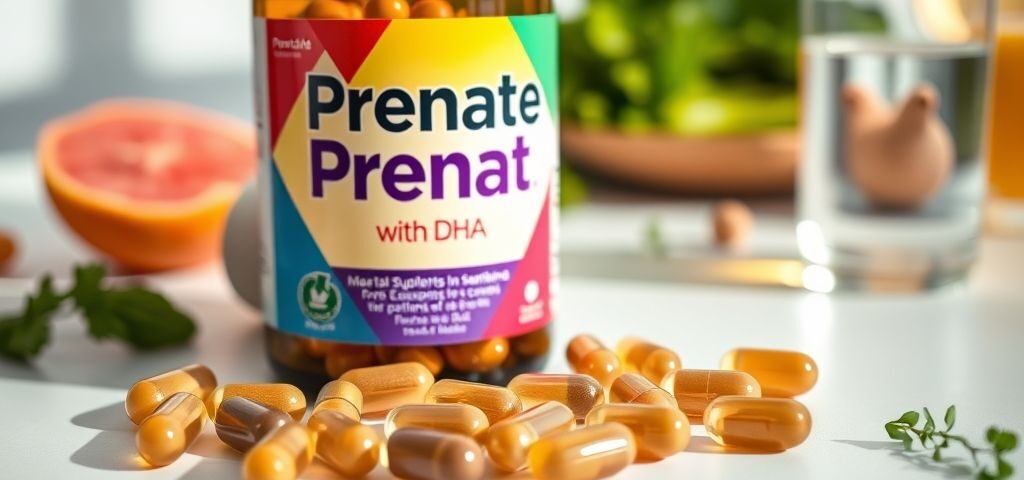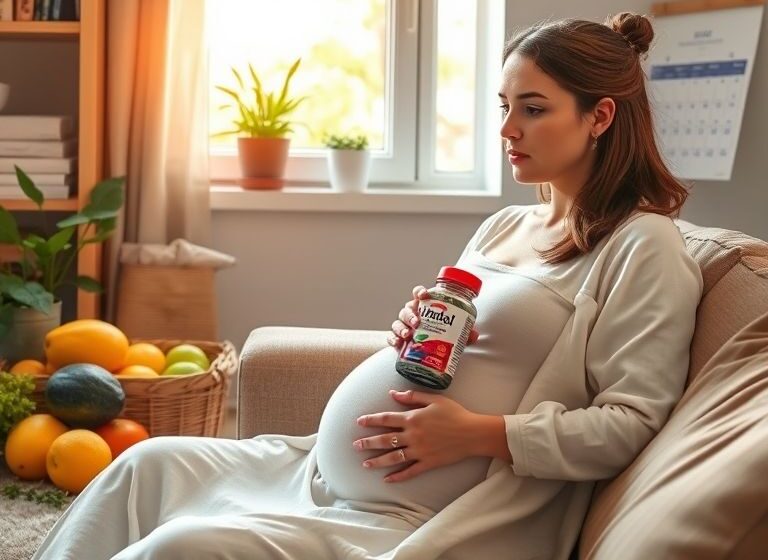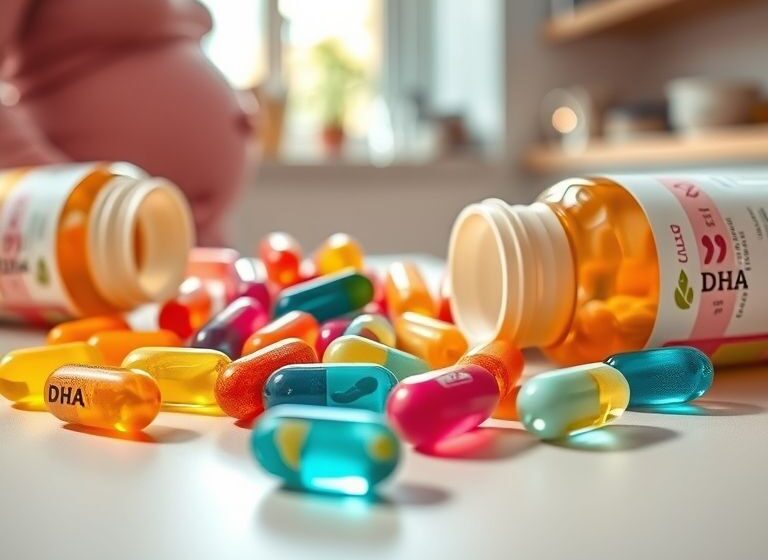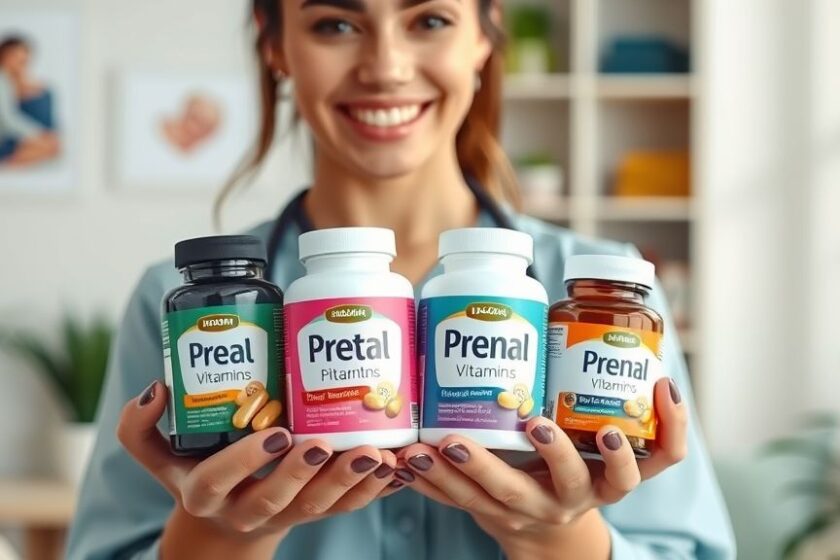Pregnancy is one of the most nutritionally demanding stages of life. Even if you eat a balanced diet, your body needs extra support to meet the demands of a growing baby. That’s where a prenatal vitamin with DHA comes in. Unlike regular multivitamins, prenatal supplements are carefully designed to provide higher amounts of the nutrients most important during pregnancy—nutrients like folic acid, iron, iodine, vitamin D, and omega-3 fatty acids.
Among these, DHA (docosahexaenoic acid) stands out. It’s an essential omega-3 that plays a major role in your baby’s brain and eye development. Unfortunately, most people don’t get enough DHA from food alone, especially if they limit fish due to mercury concerns. Choosing a prenatal vitamin with DHA helps bridge that gap safely.
But DHA isn’t the only nutrient to consider. Folic acid reduces the risk of neural tube defects, iron supports blood volume, and calcium with vitamin D strengthens bones and teeth. Together, these nutrients form the foundation of the best prenatal vitamins for a healthy pregnancy.
Why prenatal vitamins with DHA are important for you and your baby
When you’re pregnant, every nutrient you take in plays a role in shaping your baby’s future health. A prenatal vitamin with DHA isn’t just another pill on your shelf — it’s a tool to help close the nutritional gaps that even a healthy diet can leave behind. Here’s why it matters so much:
Brain and nervous system development
DHA, an omega-3 fatty acid, is critical for your baby’s brain, spinal cord, and eye development. Studies show that consistent DHA intake during pregnancy supports better cognitive and visual outcomes in infants. Without it, many women fall short of recommended omega-3 levels, especially if fish intake is limited.
Reducing neural tube defects
The folic acid in a prenatal vitamin significantly reduces the risk of neural tube defects such as spina bifida. That’s why experts recommend starting a folic acid pregnancy supplement even before conception.
Preventing anemia and supporting oxygen flow
Pregnancy increases blood volume, which raises the demand for iron. A prenatal vitamin with DHA and iron helps prevent iron-deficiency anemia, reducing fatigue and ensuring oxygen reaches both you and your baby.
Strong bones and teeth
Calcium and vitamin D work together to support skeletal growth and protect your bone health as your baby draws from your calcium stores.
Lowering the risks of pregnancy complications
Research links adequate intake of key nutrients to a reduced risk of preeclampsia, low birth weight, and preterm delivery.
Supporting your health, too
It’s easy to focus only on the baby, but a quality prenatal keeps you stronger as well. From immune function to energy production, the best prenatal vitamins are formulated to meet both maternal and fetal needs.
Essential nutrients to look for in prenatal vitamins
Not all supplements are created equal. The best prenatal vitamin with DHA should provide a complete balance of nutrients that support both you and your baby throughout pregnancy. Here’s what to look for on the label — and why each nutrient matters.
Folic Acid (Folate)
Folic acid is arguably the most critical nutrient in early pregnancy. It helps form the neural tube, which develops into your baby’s brain and spinal cord. Experts recommend at least 400–800 mcg daily before conception and during the first trimester. Many women take a folic acid pregnancy supplement alone before switching to a full prenatal vitamin with DHA.
Iron
Your blood volume can increase by up to 50% during pregnancy. Iron supports red blood cell production, prevents anemia, and ensures oxygen delivery to your baby. A quality prenatal provides around 27 mg of iron, which is difficult to get from food alone.
Vitamin D + Calcium
Your baby’s bones and teeth rely on calcium, but your body can’t absorb it well without vitamin D. Look for a prenatal that includes both nutrients. Adequate intake also reduces the risk of complications like preeclampsia.
Iodine
Iodine supports thyroid health and hormone production, both of which are crucial for brain development. Not all prenatal vitamin gummies contain iodine, so it’s worth double-checking the ingredient list.
Choline
Choline is gaining recognition as a pregnancy super-nutrient. It helps with brain and memory development, yet many prenatal supplements leave it out. If your chosen prenatal vitamin with DHA doesn’t have choline, ask your provider if you should add it separately.
Vitamin B12
For vegans or vegetarians, B12 is especially important. It works alongside folate to support nervous system health and red blood cell production.
DHA (Docosahexaenoic Acid)
The standout nutrient in a prenatal vitamin with DHA is, of course, DHA itself. This omega-3 fatty acid supports brain, eye, and nervous system development. While you can get DHA from fatty fish like salmon, most women fall short of the recommended 200–300 mg daily. A prenatal with DHA gives you peace of mind without the risk of mercury exposure from high-fish diets.
When should you start a prenatal vitamin with DHA?
Doctors and health organizations recommend starting at least one month before conception. That’s because folic acid, one of the most important nutrients in a prenatal, works best early — often before you even know you’re pregnant. Taking a folic acid pregnancy supplement or a complete prenatal vitamin with DHA in the months leading up to conception helps reduce the risk of neural tube defects and supports early cell growth.
If you’re already pregnant and haven’t started yet, don’t worry. It’s never too late. Beginning prenatal vitamins with DHA at any stage of pregnancy still supports your baby’s brain and eye development, helps maintain healthy iron levels, and fills nutrient gaps.
And the benefits don’t stop at birth. Many healthcare providers recommend continuing your prenatal vitamin with DHA while breastfeeding. DHA and other nutrients pass into breast milk, supporting your baby’s cognitive development long after delivery.
How to choose the best prenatal vitamin with DHA
Walk into any pharmacy, and you’ll see dozens of options labeled “prenatal.” But not every supplement is created equal. Choosing the right prenatal vitamin with DHA can feel overwhelming, so here’s a practical checklist to guide you.
1. Check for core nutrients
At a minimum, the best prenatal vitamins should include:
Folic acid (400–800 mcg)
Iron (around 27 mg)
Vitamin D and Calcium
Iodine
DHA (200–300 mg)
If any of these are missing, the product may not fully support pregnancy nutrition.
2. Consider the format
Some women prefer capsules, while others find prenatal vitamin gummies easier to tolerate, especially during morning sickness. Keep in mind, many gummies skip iron or iodine, so you may need to supplement separately.
3. Look for third-party testing
Supplements aren’t regulated as strictly as medications. Choosing a brand certified by USP, NSF, or another third-party lab helps ensure what’s on the label matches what’s in the bottle. This reduces concerns about contamination and dosage inconsistencies.
4. Match to your personal needs
Vegans and vegetarians should confirm that the prenatal provides vitamin B12 and plant-based DHA.
Women carrying multiples may need higher doses of certain nutrients — always check with your doctor.
Food allergies? Look for gluten-free, soy-free, or allergen-free formulas.
5. Prescription vs. over-the-counter
Your healthcare provider may recommend a prescription prenatal if you have unique needs or deficiencies. However, many OTC options provide complete support when chosen carefully.
Are prenatal vitamins with DHA safe?
For most women, taking a prenatal vitamin with DHA is not only safe but strongly recommended during pregnancy. Still, like any supplement, it’s important to understand possible side effects and safety considerations.
Common side effects
The most frequently reported issues are mild and temporary:
Constipation — often due to the iron content. Drinking plenty of water, eating fiber-rich foods, or switching to a slow-release iron formula can help.
Nausea or stomach upset — taking your prenatal vitamin with food, or at night, often reduces discomfort. Some women prefer prenatal vitamin gummies because they’re easier to digest.
Potential risks to watch for
Vitamin A (retinol): High doses of preformed vitamin A can be harmful during pregnancy. Most reputable prenatal vitamins use beta-carotene, which is safe.
Iron overload: Too much iron can cause digestive problems or, in rare cases, toxicity. Stick to recommended doses unless your doctor advises otherwise.
Calcium absorption and iron: Large doses of calcium can interfere with iron absorption. If your prenatal doesn’t balance both, your provider may suggest taking them at different times.
Quality matters
One concern with supplements is that they aren’t as tightly regulated as prescription medications. Some studies have found variations in nutrient amounts or trace contaminants in poorly manufactured products. To minimize risk, choose a prenatal vitamin with DHA that has been third-party tested (USP, NSF, or similar).
How and when to take a prenatal vitamin with DHA
Taking your prenatal vitamin with DHA correctly can make a big difference in how well your body absorbs nutrients — and how comfortable you feel while taking it. Here’s what you need to know.
1. Take with food
Iron and many vitamins are best absorbed when taken with a meal. A small snack or breakfast can help reduce nausea or stomach upset.
2. Mind timing for calcium and iron
Calcium can interfere with iron absorption, so if your prenatal contains both, consider taking it with a meal that balances these nutrients or splitting doses throughout the day.
3. Find the format that works for you
Some women tolerate capsules better, while others prefer prenatal vitamin gummies or liquid forms. If nausea is a problem, try switching formats or taking your supplement at a different time of day.
4. Consistency is key
Set a routine. Taking your prenatal vitamin with DHA at the same time every day helps build a habit and ensures your body gets steady nutrient support.
5. What to do if you miss a dose
Don’t double up. Simply take your next dose at the regular time. Consistency over weeks and months matters more than occasional missed doses.
Final thoughts on prenatal vitamins with DHA
A prenatal vitamin with DHA is one of the most effective ways to support a healthy pregnancy and give your baby a strong start. From brain and eye development to reducing the risk of neural tube defects and supporting maternal health, the benefits are clear. Choose a high-quality, third-party tested prenatal that contains DHA, folic acid, iron, iodine, and other essential nutrients.
Start early — ideally before conception — and continue through pregnancy and breastfeeding. Combined with a balanced diet, the right prenatal vitamin with DHA ensures that you and your baby receive the necessary nutrition every step of the way.
Frequently Asked Questions:
Q1. Do I need a prenatal vitamin with DHA if I eat a lot of fish?
Even with a diet rich in fish, many women don’t reach the recommended DHA levels for pregnancy. A prenatal vitamin with DHA ensures consistent intake without the risk of mercury exposure from high-mercury fish.
Q2. Are prenatal vitamin gummies with DHA effective?
Yes, gummies can be effective, but check the label. Many gummies don’t contain enough iron or iodine, so you may need additional supplementation. Capsules or tablets often provide a more complete nutrient profile.
Q3. Can I take a regular multivitamin instead of a prenatal vitamin with DHA?
Most regular multivitamins lack the specific nutrient amounts needed for pregnancy, especially DHA, folic acid, and iron. A prenatal vitamin with DHA is formulated to meet maternal and fetal nutritional needs.
Q4. When should I stop taking prenatal vitamins with DHA?
Continue through pregnancy and breastfeeding. DHA and other nutrients pass into breast milk, supporting your baby’s brain and eye development postpartum.
Q5. What if my prenatal vitamin with DHA causes nausea?
Try taking it with a small meal, switching to a different time of day, or using gummies or liquid forms. If nausea persists, consult your healthcare provider for alternative options.




